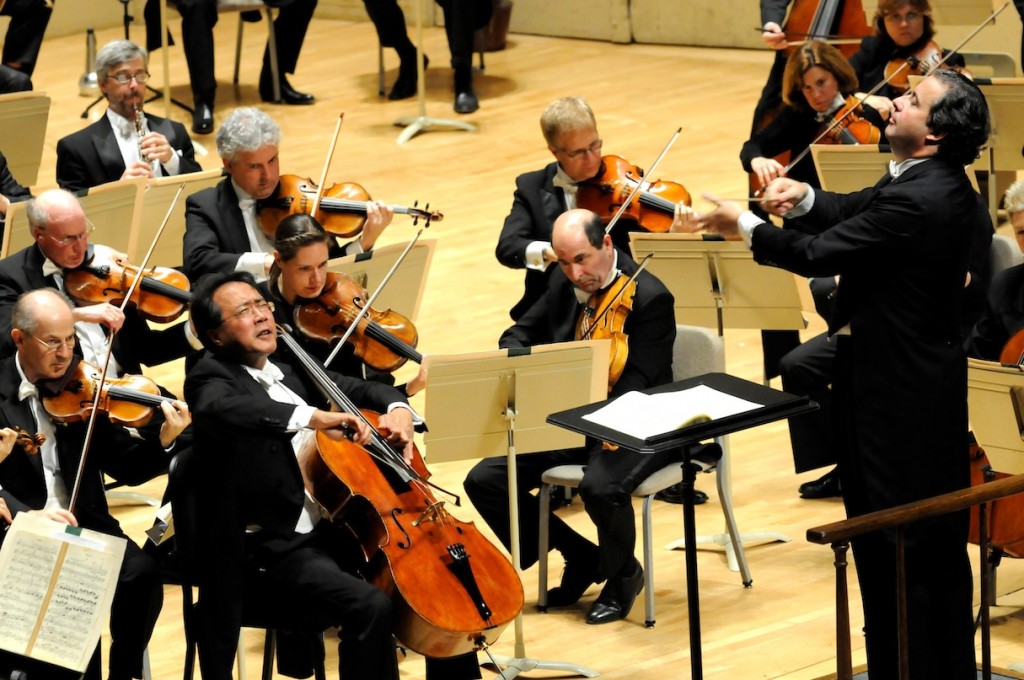Yo-Yo Ma and Dvorak prove a memorable match once again with the Boston Symphony

Yo-Yo Ma performs Dvorak's Cello Concerto with conductor Juanjo Mena and the BSO Thursday night. Photo: Stu Rosner
He is classical music’s sole first-name celebrity, and deservedly so. Yo-Yo Ma, who performed the Dvorak concerto with the Boston Symphony Orchestra Thursday evening at Symphony Hall, has not only raised the art of the cello for his generation, he has become instantly identifiable with everything that makes music great—passion, intelligence, belief in the human spirit, and even occasional Romantic excess.
It’s been nearly 30 years since his 1983 debut with the BSO, and he’s performed this concerto numerous times. Yet there was no hint of routine. Yo-Yo Ma pours his heart into everything, and Thursday’s performance was given as if the music were still wet on the page, and the composer was seated in the audience, hoping for approval.
Spanish conductor Juanjo Mena made his Symphony Hall debut with this performance, but Ma was the true leader in this concerto. For all his technical skills, he is foremost a communicator, both to his audience and to his fellows onstage. He performs the entire work, not just his own part, and draws out the best in all the musicians around him with encouraging gestures and physical signals. During one long duet with the winds in the second movement, he turned away from the audience, listening intently for the orchestral subtleties.
All this would seem like outlandish showmanship without the marvelous artistry Ma possesses. Does he ever even bother to check his fingering or bowing positions? The cello seems a part of his body, and the risks he can take because of it lead to unexpected pleasures. His sense of rubato, deeply developed, might border on the excessive if he weren’t so committed to each phrase.
Mena might have been along for the ride in the concerto, but after intermission he earned his fee, venturing Bartok’s lengthy and rarely heard ballet score, The Wooden Prince. Set for the largest orchestra imaginable, including double winds, brass aplenty (including three saxophones) and ample percussion, The Wooden Prince offers early Bartok at his folkloric best.
A prince tries to attract the attentions of a princess by hanging his hat and cloak on a walking stick. A fairy brings the walking stick to life, and the princess falls for the contrivance, leaving the prince forlorn. Adventures ensue. The lovers are reunited.
The huge orchestra gets used not for volume and power, but for color. The opening is especially striking: the music begins at the perimeters, from the back string desks while the inner circle of players sits. Gradually the sound envelops all the players, and the story begins.
Mena showed great persistence in maintaining tension all around. This score was dense, without pause for nearly an hour, and attention could have easily flagged. You won’t see the ballet revived anytime soon—imagine 120 players in an orchestra pit—but as a symphonic work, the idiosyncratic beauty of The Wooden Prince offers another facet of Bartok’s complex musical persona.
The program will be repeated 1:30 p.m. Friday, and 8 p.m. Saturday and Tuesday. bso.org; 617-266-1492.
Posted Oct 14, 2011 at 11:11 am by Michael Scott
I think Yundi is ALSO a first name only classical artist; so too, Kennedy. Lang Lang may be one, too.
:-)